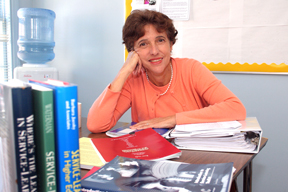The first thing Norma-May Isakow points to in her office are the photos tacked to a bulletin board over her desk.
 |
| Norma-May Isakow is the director of the new Office for Service Learning. Service learning is a component of UAB’s Quality Enhancement Plan and the Core Commitments Initiative. |
Most are of students enrolled in her civic engagement course – a service-learning course for the Social & Behavioral Science Honors Program that she currently teaches with colleague Rosie O’Beirne. There is one photo of the class gathered around the table discussing their experiences in their service-learning projects. Another is of students on the streets of Birmingham, engaging in learning more about their city. And there are many other photos of students in action, too.
“I just love these photos,” she says.
Isakow is the director of the new Office for Service Learning, which was “born” this summer. It is part of the Office for Student Academic Engagement, which is under the direction of Philip Way, Ph.D., associate provost for Undergraduate Programs.
Civic engagement is vital to the development of students and crucial to their long-term success as people, Isakow says. One photo shows how fervently she believes this to be true: It’s of her in Zambia last summer, where she was working with an HIV support group at UAB’s Center for Infectious Disease Research – engaging in her own service learning experience.
“Service learning shows students that as individuals you can do something, even if it’s just raising other people’s awareness of an issue,” Isakow says. “There’s so much, particularly in American society, to tell you the problems are too great and the forces wielding the power are so much bigger than you are.
“Civic engagement empowers students to believe in their ability to do things and the importance of seeing themselves connected to social issues outside of themselves.”
Service learning is the latest teaching model that excites students, enhances academic learning and prepares students for active citizenship as they contribute to the community, Isakow says.
Service learning links traditional academics with community service, enhancing and deepening classroom learning through thoughtful, collaborative engagement with community organizations and the people they serve. Using critical thinking, analysis and structured written reflection assignments, service learning informs and enriches academic learning while encouraging students to develop a sense of civic responsibility.
Isakow is responsible for enabling faculty to integrate service learning as part of their course instruction, if they so choose.
Isakow says she is watching her honors students flourish, and believes that UAB will benefit as a whole because of the breadth and depth of learning opportunities that students are offered through service-learning courses.
“The students understand the link between classroom learning and the world outside the classroom, which is a significant benefit both to them and to UAB,” Isakow says. “Service learning is a great way for UAB to enhance, expand and strengthen its relationship with the community.”
Three components
UAB student community-based learning takes on many forms. The three key components of service learning are community service, enhanced academic learning and purposeful civic learning.
As one of her first primary tasks Isakow had to uncover the opportunities for service learning that already existed at UAB but perhaps weren’t being fully utilized. She also had to find a framework for faculty, staff and students to better understand what it means to participate in service learning.
“Many faculty will say ‘Well we have internships.’ Yes, but internships are primarily not geared toward service or purposeful civic learning,” she says. “Internships primarily focus on developing professional skills. What we are doing in our service learning courses is focusing on service as it enhances academic learning, while at the same time raising students’ awareness for future civic participation.”
Service-learning projects
Students in the Civic Engagement class are engaged in a wide range of service-learning activities, including working with Jones Valley Urban Farm, the 1917 HIV/AIDS Clinic, Jefferson County Family Court, the Hispanic Interest Coalition of Alabama and The Crisis Center and The Women’s Fund.
Anastasia Brown is engaged in service learning with the Jefferson County Family Court, where she observes and participates in various proceedings relating to juvenile justice. Most of the families are from low-income areas. Brown says she has seen firsthand the scope of the problems in these children’s lives. “The environment most of the children are submerged in is unhealthy, but it does not seem that any one institution has the ability to handle social problems of this magnitude,” she says.
Isakow and Brown agree that the experience has helped the student understand some of the concepts and theories she has been learning in the classroom.
“Anastasia has really come to realize the enormity of problems facing children in low-income areas who don’t have much social capital,” Isakow says. “The social capital available to them might be as part of a gang or other subculture, rather than as part of a social unit conducive to advancement in mainstream culture.”
Service learning is a component of UAB’s Quality Enhancement Plan and the Core Commitments Initiative.
For more on service learning and how the Office for Service Learning can aid faculty, staff or students, visit www.uab.edu/servicelearning or contact Isakow at nmisakow@uab.edu .